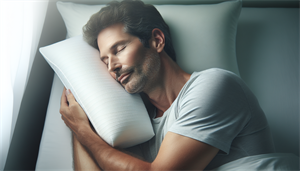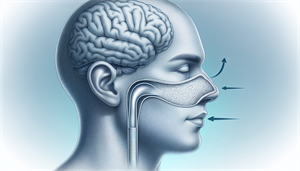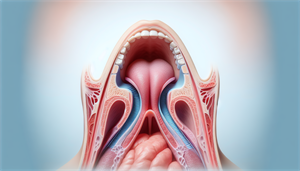Picture yourself waking up in the morning with an uncomfortable dry mouth, bad breath, and an odd sense of fatigue. You’ve tried mouth taping to curb your nighttime mouth breathing, but it’s led to skin irritation and just doesn’t feel right.
What if I told you that there are effective alternatives that can help you breathe easy and sleep better, without a piece of tape on your mouth?
In this article, we will discuss “what is an alternative to mouth tape” to help you find a solution that works for you.
Key Takeaways
-
Mouth taping can cause safety concerns and there are better alternatives like changing sleep posture, using special pillows, mouthpieces, and improving overall sleep hygiene.
-
If the source of your snoring is your nose, mouth taping can make it difficult to breathe at night and cause adverse effects.
-
Professional help like consulting a sleep specialist and managing conditions like allergies or asthma can significantly help in improving breathing and sleep quality without mouth taping.
Understanding Mouth Breathing and Its Effects

Mouth breathing might seem like a harmless habit, but it can lead to a host of complications. When you breathe through your mouth instead of your nose, you’re not only more prone to dry mouth and bad breath, but it can also affect facial growth and lead to poor air quality. Understandably, many resort to mouth taping, a technique that promotes nasal breathing by closing the mouth. But hold up, is mouth taping safe?
Well, imagine taping your mouth shut with a sticky piece of tape while you sleep. It can block your nose, reduce oxygen flow, potentially leading to heart issues or seizures, and cause skin irritation around the mouth. That doesn’t sound too appealing, does it? It’s particularly risky for those with respiratory issues, allergies, asthma, or anatomical limitations such as a deviated septum or nasal polyps. This is why we need safer alternatives to mouth taping that can effectively curb mouth breathing.
Thankfully, safer alternatives are available. They range from changing your sleeping posture to seeking advice from a sleep expert. These alternatives aim to improve your breathing and enhance sleep quality.
Switching Sleep Positions

Are you aware that your sleep position can have a significant impact on your breathing? One great way to reduce snoring and mouth breathing is by sleeping on your side. This position can help prevent airway blockage and promote better breathing during sleep. Sounds simple, right? But how do you ensure you maintain this position all night long?
Here, pillows play a significant role. By using a few well-placed pillows, you can train yourself to sleep on your side, which can encourage nose breathing and prevent you from rolling over. You might also want to consider investing in a new mattress and pillow. A comfortable bed can make side-sleeping more appealing and help you transition from less beneficial sleeping positions.
Using Pillows for Support
Using pillows for support isn’t just about comfort. It’s a strategy that can help you train your body to sleep on its side and reduce mouth breathing. But not just any pillow will do. If you’re a side sleeper or a mouth breather, consider getting pillows like the Saatva Latex Pillow, Eli & Elm Side Sleeper, or the Casper Hybrid Pillow. These pillows are designed to provide the right balance of support and comfort for side sleepers.
For optimal support, use a thicker and firmer pillow under your head. Adding a pillow between your knees can help keep your spine aligned and prevent joint discomfort. This setup not only enhances your comfort but also helps stop mouth breathing during sleep.
Such pillows not only enhance comfort but also significantly improve sleep quality. By providing support for side sleeping, they can help:
-
Reduce snoring
-
Improve sleep quality
-
Help with mouth breathing issues
-
Help with obstructive sleep apnea
Nasal Strips and Dilators

If you struggle with a blocked nose or difficulty breathing through it, you might want to consider nasal strips and dilators. These devices, which can be external or internal, are designed to open up the nasal passages, helping to clear up congestion and make it easier to breathe through the nose. Essentially, they do the job of mouth tape without the risk of skin irritation.
The way nasal dilators work is simple. They expand your nasal passages, reducing congestion and making it easier to breathe through your nose, particularly while sleeping. This can be particularly beneficial for people who suffer from mouth breathing.
However, it’s important to note that results can vary. While some people find that nasal strips like Breathe Right can reduce snoring and improve sleep, others may not notice a significant difference. Even though they might not be a foolproof solution for everyone, they’re worth a shot for those looking for a non-invasive alternative to mouth taping.
Mouthpieces
If you're struggling with the discomfort and skin irritation caused by mouth taping to control nighttime mouth breathing, consider snoring mouthpieces as a viable alternative. These devices are designed to ensure easier breathing and better sleep quality without the need for adhesive tape.
Snoring mouthpieces work by repositioning the jaw or tongue, maintaining an open airway throughout the night. This can significantly reduce mouth breathing and snoring, addressing issues like dry mouth and bad breath when you wake up.
Alongside adopting sleep-friendly postures and using specialized pillows, these mouthpieces can be a more comfortable and effective solution. Consulting a sleep specialist can also provide tailored advice on managing any underlying conditions like allergies or asthma, further enhancing your sleep quality without resorting to mouth taping.
Treating Nasal Obstruction
Individuals with allergies or asthma frequently deal with nasal congestion, causing them to breathe through the mouth. But treating these conditions can help clear up your nose and make it easier to breathe through it instead of your mouth. So, if you’ve been reaching for the mouth tape every night because of a stuffy nose, it might be time to reconsider.
Allergy medications can help clear up congestion and reduce mouth breathing. For optimal results, it’s best to take 24-hour allergy medication at night, while short-acting allergy medication is most effective shortly after taking it. This approach can be a good alternative to using mouth tape for some people and can significantly improve your sleep quality.
For those with asthma, it’s crucial to manage your symptoms in collaboration with a healthcare provider. This might include avoiding triggers and using medications as needed. By effectively managing asthma, you can alleviate stuffy noses and reduce mouth breathing, which can be particularly beneficial for mouth breathers.
Maintaining Good Oral and Sleep Hygiene

While oral and sleep hygiene might not immediately strike you as alternatives to mouth taping, they significantly contribute to your overall well-being and the quality of your sleep. Proper oral hygiene can prevent sleep problems, while good sleep hygiene can reduce mouth breathing.
Enhancing your sleep habits can also contribute to controlling mouth breathing. This can include trying out different sleep positions that promote nose breathing, sticking to a regular sleep schedule, and ensuring your sleeping environment is comfortable. These aspects will be examined more thoroughly in the subsequent subsections.
Oral Hygiene Routine
Keeping a consistent oral hygiene routine is a vital component of maintaining overall health. A clean mouth not only prevents dental issues but can also help with the bad breath and dry mouth often associated with mouth breathing. Brushing your teeth with a good toothbrush and using a water flosser can ensure that your mouth is clean and free of food particles.
There are several toothbrushes on the market that can help you maintain good oral hygiene. Brands like GUM 525E Toothbrush, Oral-B Genius 9600 Electric Toothbrush, and Philips Sonicare are all excellent options for keeping your mouth clean and fresh.
In addition to brushing, using a water flosser can effectively clean between your teeth. This device uses pressure and pulsation to remove food and bacteria, preventing plaque buildup. The American Dental Association recommends using a water flosser once a day and replacing it every 3-6 months for optimal oral health.
Sleep Environment and Routine
The environment in which you sleep and your sleeping routine considerably affect the quality of your sleep and can aid in managing mouth breathing. Here are some tips for creating a healthy sleep environment:
-
Maintain a consistent sleep schedule
-
Keep your bedroom quiet and dark
-
Ensure a comfortable temperature
-
Minimize visual and auditory stimuli
-
Limit electronic distractions
Following these tips can help improve the quality of your sleep and manage mouth breathing.
Noise in the sleep environment can disrupt your sleep and contribute to mouth breathing. Thus, ensuring a quiet sleep environment and keeping your mouth shut is essential for mouth breathers.
Keeping a regular sleep schedule is another critical aspect of good sleep hygiene. A consistent bedtime and wake-up time can help improve your sleep quality, reduce mouth breathing, and possibly eliminate the need for mouth taping.
Professional Help: Consulting a Sleep Specialist
Under certain circumstances, seeking professional assistance may be required. Sleep experts have the ability to identify and treat hidden sleep disorders, offering a more efficient solution than mouth taping. They do this by taking into account your medical history, conducting a physical exam, and analyzing your sleep patterns.
Sleep specialists can provide various treatments, including:
-
Cognitive behavioral therapy for insomnia (CBT-I)
-
Sleep aids like melatonin and zolpidem
-
Lifestyle changes
-
Medications
All of these can contribute to better sleep.
Apart from dealing with sleep disorders, sleep specialists can also assist with mouth breathing issues. They can provide the following treatments and solutions:
-
Myofunctional therapy
-
Addressing nasal obstructions
-
Ensuring your sleep setup is optimal
-
Offering CPAP treatment if necessary
Having a sleep specialist by your side can be a game-changer if you’re battling mouth breathing or other sleep-related issues, such as mild sleep apnea.
Summary
To sum it up, mouth taping might not be the safest or most comfortable solution for mouth breathing and snoring. However, alternatives such as changing sleep positions, using nasal strips and dilators, treating nasal obstructions, maintaining good oral and sleep hygiene, and consulting a sleep specialist can provide effective solutions. Remember, everyone is different, and what works best for you may vary. So, why not explore these alternatives and breathe easy towards better sleep?
Frequently Asked Questions
Can you use normal tape instead of mouth tape?
No, it's not a good idea to use normal tape for mouth taping as it can cause irritation or an allergic reaction. Look for adhesive strips specifically designed for mouth taping if you want to try it.
What is the new trend in mouth taping?
The new trend in mouth taping is to tape your mouth shut at night to help with breathing through your nose.
What are the negatives to mouth taping?
Mouth taping can lead to difficulty breathing, skin irritation, and anxiety, so it's important to be cautious when considering this practice.
Can changing my sleep position help with mouth breathing?
Yes, sleeping on your side can help reduce mouth breathing and snoring. Give it a try and see if it helps improve your breathing during sleep.
What are some good toothbrushes for maintaining oral hygiene?
Check out toothbrushes like GUM 525E, Oral-B Genius 9600, and Philips Sonicare for maintaining oral hygiene. They are highly recommended for keeping your mouth clean and healthy.


